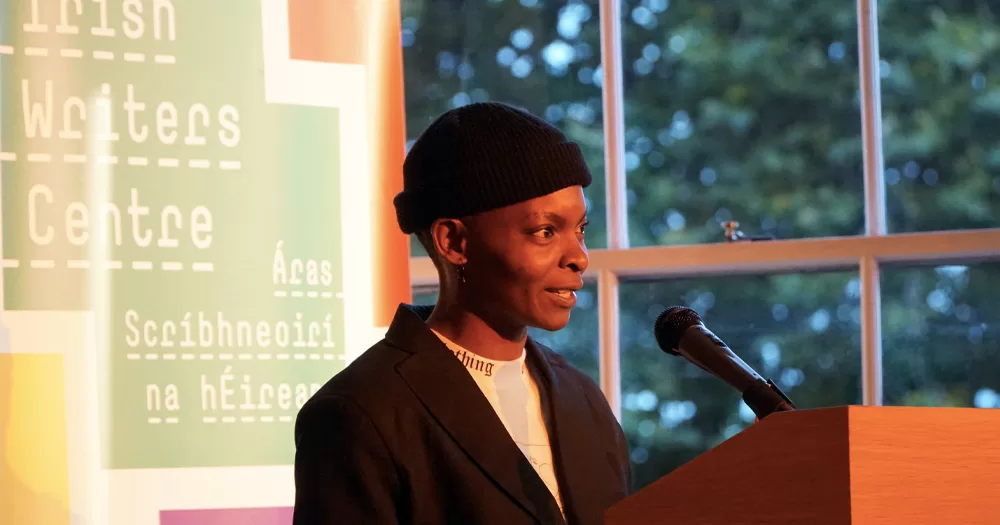After winning the Person of the Year award at the GALAS 2023, activist Beryl Ohas reflects on the visibility of the Black queer community in Ireland.
As a refugee, Black History Month to me is a time to reflect on our Black queer roots, our authentic and unfiltered lived experiences and culture entwined with the Black queer history of dance, style and identity. Because we don’t just come here for safety, a 9-5 job and education, we also bring our knowledge, beliefs, experiences and realities, which have influenced Ireland to become a more mature and diverse state.
In celebration of Black History Month, Gorm Media and Black and Irish are some organisations that give some perspective on being Black LGBTQ+ people in Ireland today, unifying the communities and giving voice and recognition to the BIPOC queer folk in Ireland.
I’d like to recognise incredible activists such as Christine O’Mahony, who won the Trailblazer category at this year’s GALAS Awards; and Tino, the founder of queer ballroom collective Haus of Schiaparelli that had its first Black and Brown-led ball of the season, which was a huge success. But also young creatives and ordinary people like myself, as I have won the Person of the Year 2023 at the GALAS and was included in the Black and Irish book, showcasing Black and Irish legends, trailblazers and everyday heroes.
Happy publication day! ?? #blackandirishbook pic.twitter.com/hzoU1kCMQY
— Black and Irish (@Black_andirish) October 1, 2023
Queerness and explorations of sexuality are often whitewashed, with events such as Pride centring the white narrative and lacking diversity. To me, this isn’t entirely their fault. How can it be if our own Black communities at large would rather silence us based on our cultures, religion, or traditional beliefs? Our ancestral liberation stories erased us from history up until now and most of the countries we come from still fight against our very existence, while few of us successfully seek protection in the West.
Without our queer roots and history, we are lost sheep, defining parts of ourselves through the lenses of Western queer liberation and culture, which gives some sense of belonging with an underlying feeling of a missing piece, almost like a lonely highway in the dark.
Most Black-led organisations are hesitant to include gay, lesbian, bisexual, trans and non-binary individuals as a substantial part of Black people’s reality, especially of African descent, as most still deem queerness as un-African or something utterly new and uncomfortable. This is why we see uncountable supporters during Pride, using the LGBTQ+ flags on their websites for profit, but failing to recognise and acknowledge the people that they claim to represent.
“Relocating to a new country as a lesbian woman from a country that criminalises same-sex relationships was an exciting opportunity for a fresh start, and the only way to stay alive.” Beryl Ohas shares her story in GCN’s new issue ? https://t.co/NzyneVo5Sv pic.twitter.com/NHyN7gKe7u
— Gay Community News (@GCNmag) November 2, 2022
As we say, “No Ally-ship, No funding”. We need more people from our Black community to stand in the frontlines with us not just when they need a one-minute picture for their websites or mobilising us to purchase tickets to their night events, then act like strangers during the day, afraid to be stereotyped as part of the LGBTQ+ community. I call it exploitation: making our presence visible only if it benefits them somehow, yet rendering us invisible when we need them the most. This has resulted in many people being closeted, our existence known yet preferred to be unknown.
As activists, we are still driving that change, encouraging the practice of addressing our internalised homo/bi/transphobia as a tactic to eradicate anti-Blackness, allowing us to creatively re-tell our stories, bring to light some of the undiscovered experiences, especially those of trans people who are rarely recognised for their contributions as an essential policy to the advancement of all Black people in the reorientation of Black history month in Ireland.
This indeed will empower younger generations to be confident in themselves and celebrate the BIPOC queer liberation creating more role models and brave leaders. Let’s put our heads together and dream the same dream, inclusive and visible.
© 2023 GCN (Gay Community News). All rights reserved.
Support GCN
GCN is a free, vital resource for Ireland’s LGBTQ+ community since 1988.
GCN is a trading name of National LGBT Federation CLG, a registered charity - Charity Number: 20034580.
GCN relies on the generous support of the community and allies to sustain the crucial work that we do. Producing GCN is costly, and, in an industry which has been hugely impacted by rising costs, we need your support to help sustain and grow this vital resource.
Supporting GCN for as little as €1.99 per month will help us continue our work as Ireland’s free, independent LGBTQ+ media.
